Big Differences Between Irish Wolfhound vs Great Dane (Photos)
Two breeds likely come to mind when you think of big dogs: the Irish Wolfhound and the Great Dane. These lovable canines have a lot of traits in common, but they also have many differences.
It may feel tempting to lump these two breeds together, but doing so can be a great disservice to your furry friend. Knowing about the differences between Irish Wolfhounds vs. Great Danes can help you be a better pet owner.
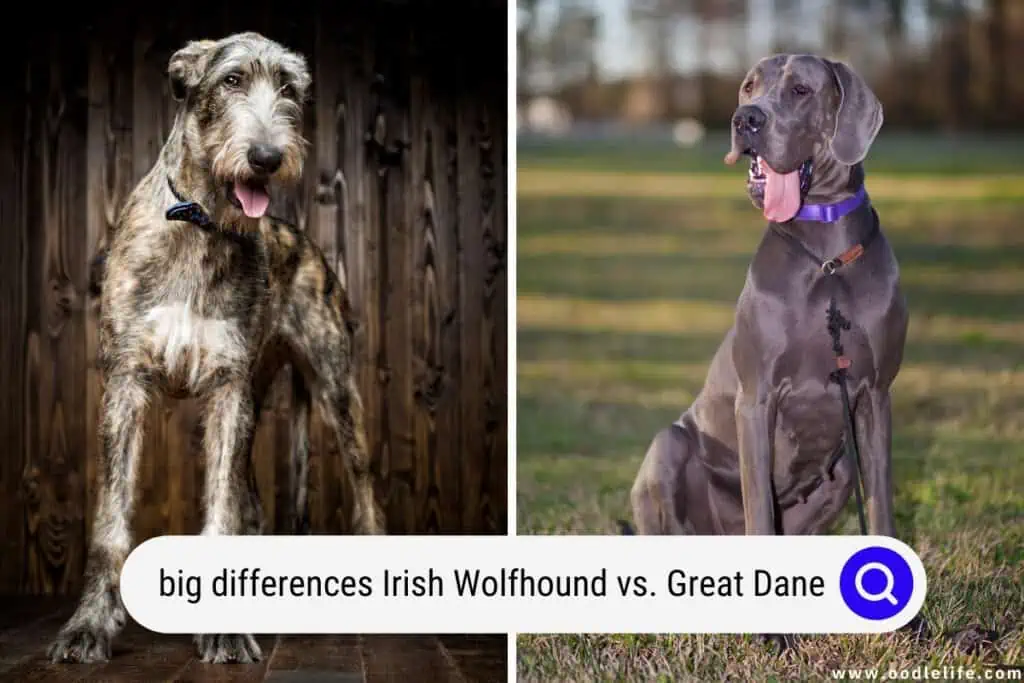
So before you adopt one of these lovable dogs, you may want to understand how they differ from each other first. As you read onward, I’ll explain more about the important differences between the Irish Wolfhound and the Great Dane.
Size Differences
Both Irish Wolfhounds and Great Danes have a reputation for their massive size. However, determining which one is the bigger breed can be a little tricky.
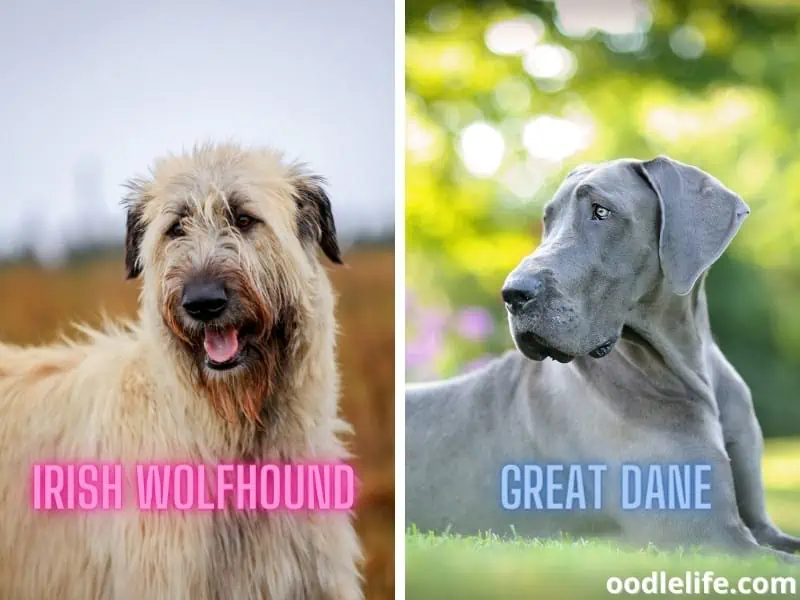
An adult Great Dane usually weighs up to 160 pounds, while an adult Irish Wolfhound weighs 120 pounds during adulthood. This means the Great Dane is heavier than the Irish Wolfhound.
However, this does not necessarily mean the Great Dane is bigger in all aspects. While a Great Dane stands at 32 inches tall, an Irish Wolfhound can reach up to 36 inches tall. So while the Great Dane may have more mass than the Irish Wolfhound, the Irish Wolfhound is the taller of the two breeds.
Fur Texture and Length
Fur texture is an important factor when it comes to adopting a dog. Some people prefer dogs with ultra-soft fur, while others prefer canines with wiry fur. Different fur types may require extra maintenance, too, so keep those in mind when deciding which dog breed is right for you.
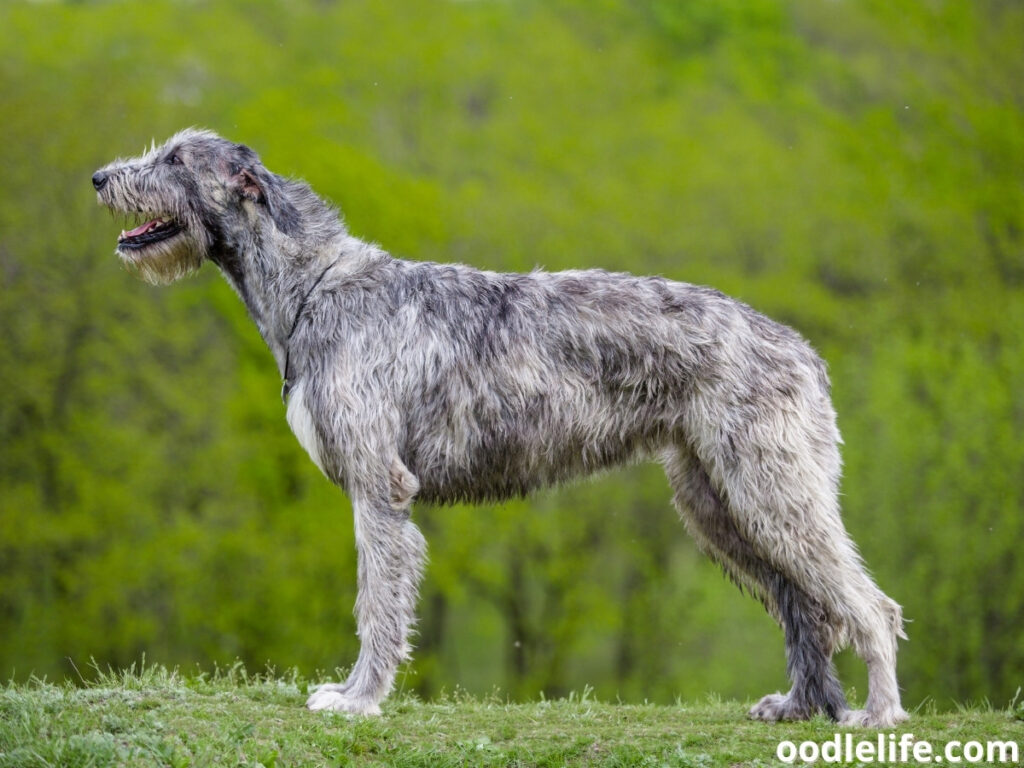
If you’re a fan of dogs with soft fur, you will likely prefer the Great Dane. These dogs have short fur with a silky-smooth texture. Because of this trait, their fur will not need very much grooming.
If you prefer dogs with wiry fur, the Irish Wolfhound might be the better dog for you. This breed has medium-length fur with a coarse texture. Because of their fur length, you will need to brush and groom them more often than you would a Great Dane.
Coloring and Patterns
Dogs can come in many unique colors and patterns—but what about Irish Wolfhounds and Great Danes?
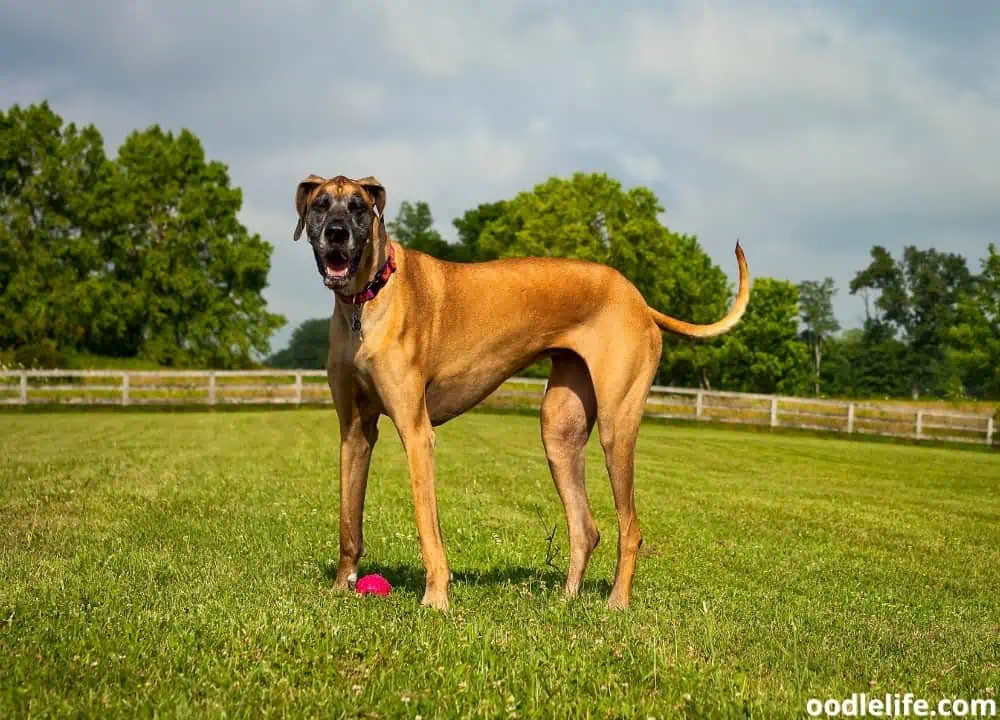
Irish Wolfhounds don’t have a lot of variety when it comes to fur markings. You can typically find them with solid-color fur or with a brindle pattern. Their fur is usually gray, black, white, or beige.
Great Danes, on the other hand, have a little more variety in their fur markings. You can find them with harlequin, piebald, merle, or mantle patterns in their fur. Great Danes typically have black, white, brown, and blue-gray coats.
Noisiness Level
Some dogs are noisier than others. Knowing whether a dog breed is quiet or chatty is essential before adopting one.
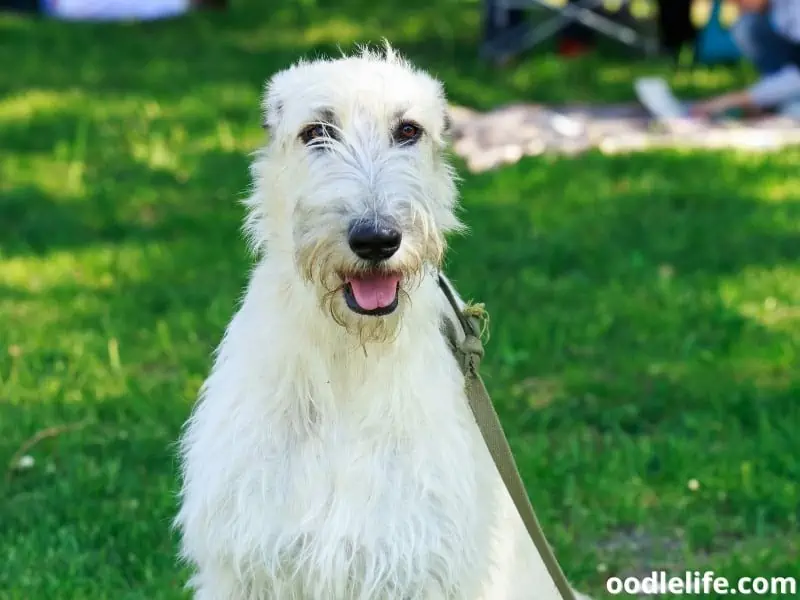
If you want plenty of peace and quiet in your house, you may prefer the Irish Wolfhound. These dogs do not bark very often unless they want to alert you.
But if you don’t mind a dog that speaks its mind, the Great Dane may be a good fit. These dogs can bark up a storm, which is ideal if you want a protective watchdog for your home.
Of course, training plays a big part in your dog’s noisiness level. Regardless of the breed, if you feel like your dog’s barking out of control, a little bit of patience and training can help reduce the problem.
How Much Do They Drool?
Many dog owners don’t mind drooling, while others see it as a dealbreaker. So, when it comes to Irish Wolfhounds vs. Great Danes, which one drools more?
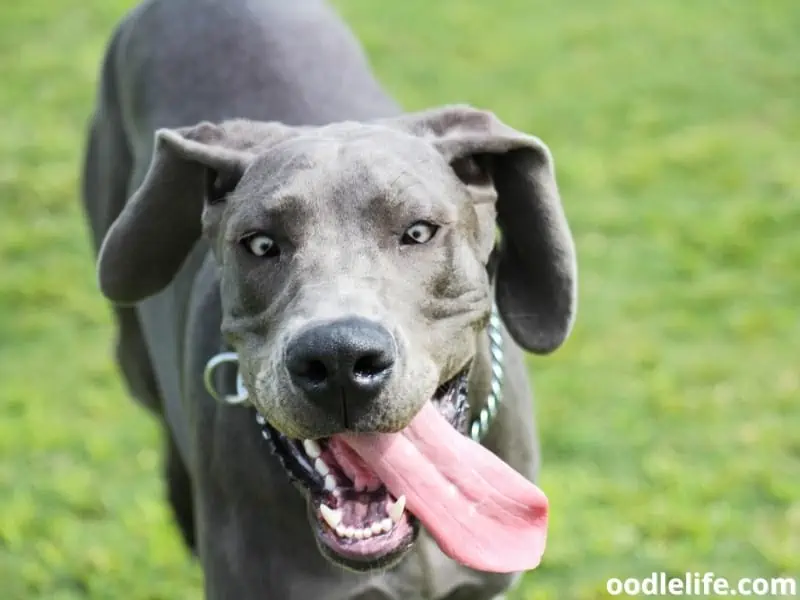
People who find drooling gross may want to choose the Irish Wolfhound. While these dogs do salivate from time to time, it is rather sparse compared to many dog breeds.
If you are the type of dog owner that doesn’t mind saliva, the Great Dane may be the dog for you. These dogs can be pretty big droolers, so keep a washcloth nearby!
Potential Health Risks
Many dog breeds have unique health risks, and Irish Wolfhounds and Great Danes are no exception.
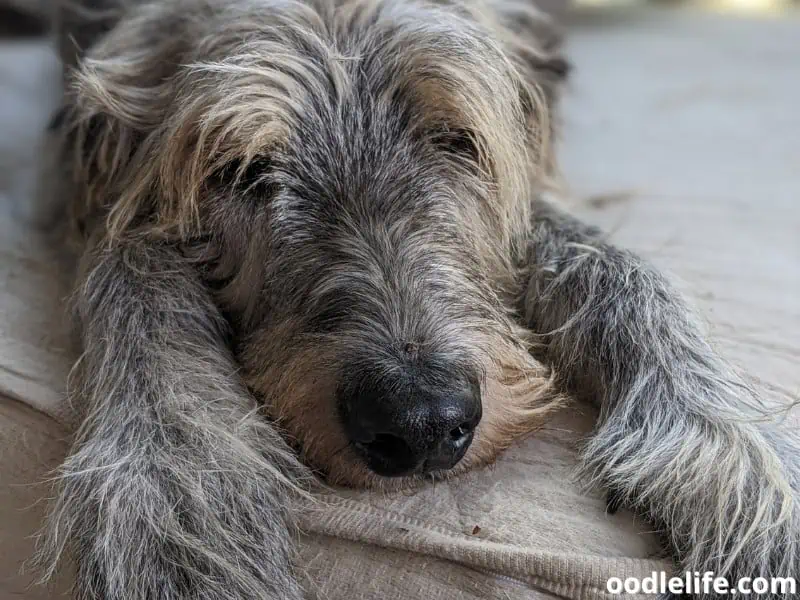
If you have an Irish Wolfhound, they may have a higher risk of conditions such as:
- Megaesophagus
- Progressive retinal atrophy
- Willebrand’s disease
- Joint pain
Great Danes have a heightened risk of these conditions:
- Wobbler syndrome
- Ear infections
- Hip dysplasia
- Cataracts
Neither of these dogs is guaranteed to develop any of these conditions. Irish Wolfhounds and Great Danes can live happy lives with little to no health issues.
However, if you plan on adopting one of these dogs, make sure to know the signs of these conditions so you can catch them early.
Average Lifespan
We all want our dogs to live forever, but every breed of dog has a different life expectancy. In general, large dog breeds tend to have shorter lifespans compared to small dogs, so both the Irish Wolfhound and Great Dane are relatively short-lived breeds.
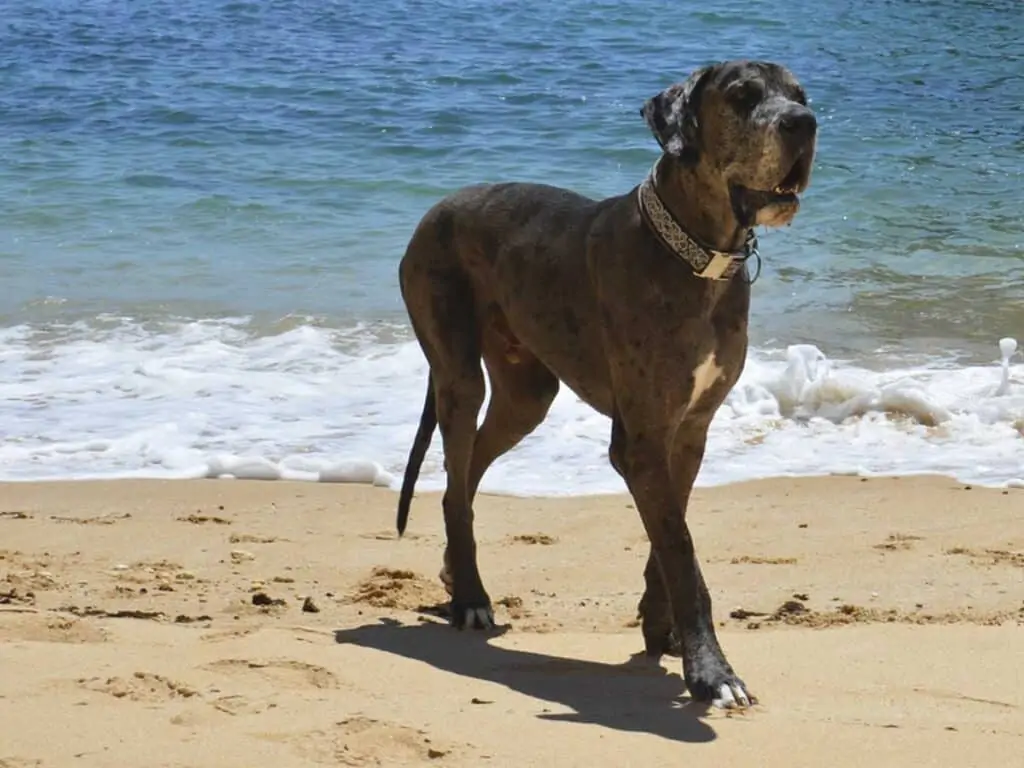
The Irish Wolfhound can live up to ten years, but on average, they usually live to be seven years old.
The Great Dane also doesn’t usually live for more than ten years. However, their average lifespan is eight years.
Which Is More Popular?
When it comes to Irish Wolfhounds vs. Great Danes, you may be wondering which is more popular.
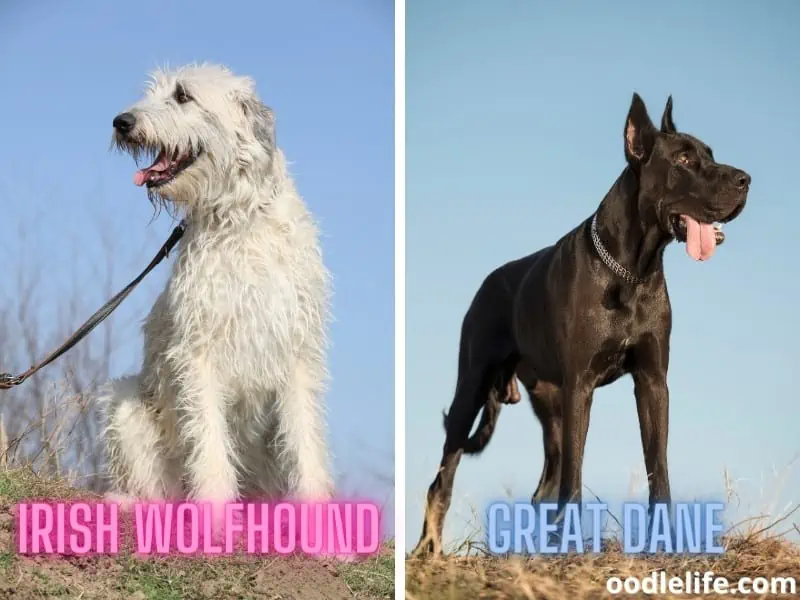
According to the Kennel Clubs, the Great Dane was the 17th most popular dog breed in 2021. The Irish Wolfhound was far more uncommon, ranking in 85th place.
Of course, a dog’s popularity has no bearing on how suitable they are for you. The Great Dane may be popular, but it’s not the dog for everyone. And while the Irish Wolfhound is somewhat unpopular, it may be the perfect companion for you.
What Do They Have in Common?
I’ve discussed the differences between the Irish Wolfhound and the Great Dane, but what about their similarities?
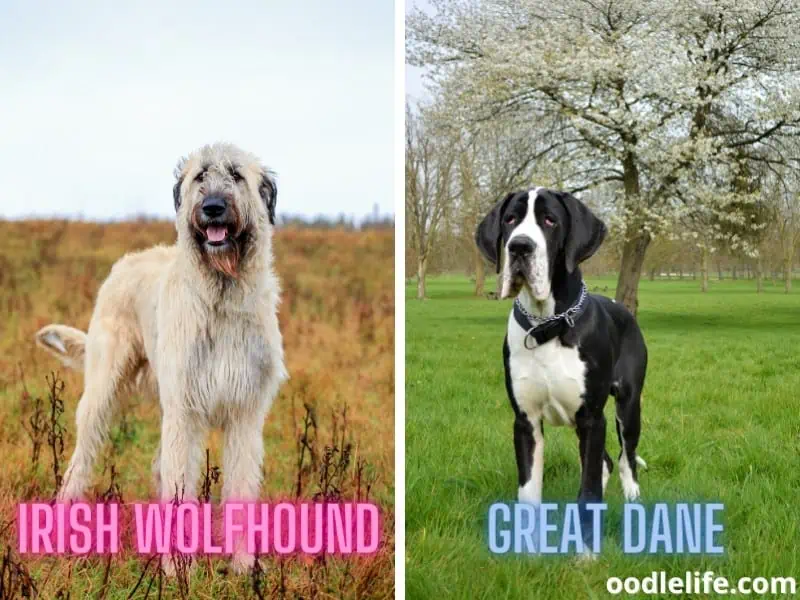
You may be surprised to learn that these two dog breeds have quite a bit in common. Here are a few traits these lovable dogs share:
- Both the Irish Wolfhound and Great Dane are incredibly affectionate dog breeds. No matter which one you have, you can expect lots of cuddles and attention!
- Both dog breeds are very protective of their families. While this is a positive trait if you want a protective watchdog, it also means they can be somewhat territorial.
- Both dogs are excellent family pets. However, because of their size and territorial nature, you should be cautious when they are around little ones. Ensure you never leave them alone with small children.
- Both breeds are compatible with other dogs. So if you have a multi-pet household, the Irish Wolfhound and Great Dane are equally wise choices.
- Both the Irish Wolfhound and the Great Dane are huge dogs! No matter which one you choose, you can expect a massive furry friend in these dogs.
Which Breed Is Better? Irish Wolfhound vs. Great Dane
Now that you know the difference between the Irish Wolfhound and the Great Dane, you may wonder which dog breed is the best.
There is no straightforward answer to that question. Irish Wolfhounds and Great Danes have traits that appeal to some owners but can be downsides to others.
So if you want to decide which breed is better for you, consider what you are looking for in a dog. Do you want a trendy pet or something more uncommon? Do you want a quiet dog, or do you not mind a big barker?
These are just a few questions to ask yourself before choosing a dog.
And rest assured that no matter which dog breed you choose, you can expect a lovable friend for years to come!